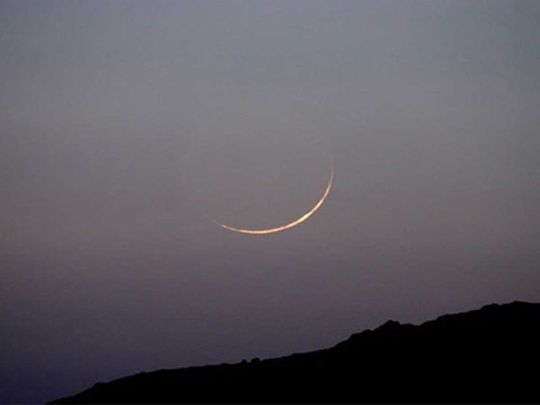
Dubai: The International Astronomical Center (IAC) has announced the sighting of the crescent moon marking the beginning of Ramadan. The observation took place on Wednesday at 8:15 am in Abu Dhabi.
In a tweet published today morning, the IAC shared the first image of the Ramadan 1444 AH crescent. Captured by the Astronomical Seal Observatory of the International Astronomy Center, the photograph was taken shortly before sunrise in Abu Dhabi on Wednesday, March 22, 2023, at 08:15 am UAE time. At the moment of the photo, the moon was 7.4 degrees away from the sun.
This means tomorrow, Thursday March 23, will be the first day of Ramadan.
At 10:30 am (UAE time), the centre captured a clearer image of the Ramadan crescent. The moon was 8.2 degrees away from the sun when this photo was taken. Due to the increasing distance between the moon and the sun and the horizon, the view is clearer.
On the first day of Ramadan, Muslims in UAE will begin their fast at 5.03am and end it at 6.31pm, observing a total of 13 hours and 28 minutes of fasting. As the days progress, the fasting time will increase by a few minutes eachday due to the approaching summer season, when days become longer.
The second day of Ramadan will see a slightly longer fast of 13 hours and 31 minutes, with the Fajr prayer time starting at 5.01am and the Maghrib prayer time being pushed slightly to 6.33pm. Towards the end of Ramadan, the iftar time in Dubai will take place at 6.45pm.
Ramadan is a significant month for Muslims all over the world, as they observe one of the five pillars of Islam. Fasting during this month is a way for Muslims to purify themselves physically and spiritually, increase self-discipline, and show empathy for those who are less fortunate.
During Ramadan, Muslims partake in two main meals - suhoor and iftar. Suhoor is the pre-dawn meal consumed by Muslims before they begin their fast for the day. It is typically eaten in the early hours of the morning, before the first prayer of the day. The meal is meant to provide sustenance for the long day of fasting ahead, and is usually made up of healthy, energy-rich foods like whole grains, fruits, and proteins.
Muslims believe that suhoor is an important part of the fast, as it helps to regulate blood sugar levels and prevent dehydration throughout the day. It is also seen as a time to pray and reflect on one's spiritual journey during the month of Ramadan.
Once the sun sets, Muslims break their fast with iftar, which is a communal meal that often includes family, friends, and members of the community. The meal is usually eaten together, and is seen as a time for celebration and reflection.
Iftar can take many different forms, depending on the cultural traditions of the region. In some places, it is a large feast with many dishes, while in others it is a simpler meal of dates and water. Regardless of the form it takes, however, iftar is a time for Muslims to come together and share in the experience of fasting.
Ramadan 2023 in UAE
- UAE announces cannon firing locations during Ramadan
- Ramadan 2023 in Sharjah: Working hours, timing changes, paid parking hours – all you need to know
- UAE: 3-day weekend announced for government workers in Umm Al Quwain during Ramadan
- Ramadan 2023: Timings for Dubai Metro, Tram, buses, parking zones and more
Ramadan annual date
The Islamic calendar, consisting of 12 lunar months totaling either 354 or 355 days, causes Ramadan to start on a different date each year, causing the fasting month to move up to 10 days earlier each year in the Gregorian calendar.
Non-Muslims are not required to fast during Ramadan, but they must respect the customs and traditions of the Holy Month. The UAE government has rules for non-Muslims to follow during Ramadan, including refraining from eating, drinking, smoking, or chewing gum in public during the fasting hours.
Non-Muslims must also avoid engaging in any aggressive behavior, playing loud music, wearing inappropriate clothing, and using any offensive language. Joining in the spirit of the season by accepting invitations to Iftar meals is encouraged.
Although most people in the UAE will be fasting during the day, some malls and restaurants will remain open during Ramadan to serve non-Muslims, children, and the elderly. These establishments must still adhere to the rules and regulations set out by the UAE government during Ramadan.
Working hours?
During Ramadan, private sector workers in the UAE can expect to work six hours per day or 36 hours per week, instead of the usual eight hours per day or 48 hours per week required by the country's labor law. The time it takes to commute to the workplace will not count as working hours, except for certain categories of workers as specified by the ‘Executive Regulations of the Labor Law.’
The UAE timings for Iftar during Ramadan are as follows:
• March 23: 18:31
• March 24: 18:32
• March 25: 18:32
• March 26: 18:33
• March 27: 18:33
• March 28: 18:33
• March 29: 18:34
• March 30: 18:34
• March 31: 18:35
• April 01: 18:35
• April 02: 18:36
• April 03: 18:36
• April 04: 18:37
• April 05: 18:37
• April 06: 18:37
• April 07: 18:38
• April 08: 18:38
• April 09: 18:39
• April 10: 18:39
• April 11: 18:40
• April 12: 18:40
• April 13: 18:41
• April 14: 18:41
• April 15: 18:41
• April 16: 18:42
• April 17: 18:42
• April 18: 18:43
• April 19: 18:43
• April 20: 18:44
• April 21: 18:44






